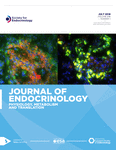Curcumin suppresses HIF1A synthesis and VEGFA release in pituitary adenomas
- B Shan,
- C Schaaf,
- A Schmidt,
- K Lucia,
- M Buchfelder1,
- M Losa2,
- D Kuhlen3,
- J Kreutzer3,
- M J Perone4,5,
- E Arzt4,5,
- G K Stalla and
- U Renner
- Neuroendocrinology Group, Max Planck Institute of Psychiatry, Kraepelinstraße 10, D-80804 Munich, Germany
1Department of Neurosurgery, University of Erlangen–Nuremburg, Schwabachanlage 6, 91594 Erlangen, Germany
2Department of Neurosurgery, Istituto San Raffaele, Via Olgettina 60, 20132 Milano, Italy
3Department of Neurosurgery, Technical University Munich, Ismaninger Straße 22, 81675 Munich, Germany
4Laboratorio de Fisiología y Biología Molecular, Departamento de Fisiología y Biología Molecular y Celular, Facultad de Ciencias Exactas y Naturales, Universidad de Buenos Aires, Buenos Aires, Argentina
5IBioBA–CONICET, Max Planck Partner Institute, RA-1428 Buenos Aires, Argentina
- (Correspondence should be addressed to U Renner; Email: renner{at}mpipsykl.mpg.de)
Abstract
Curcumin (diferuloylmethane), a polyphenolic compound derived from the spice plant Curcuma longa, displays multiple actions on solid tumours including anti-angiogenic effects. Here we have studied in rodent and human pituitary tumour cells the influence of curcumin on the production of hypoxia inducible factor 1α (HIF1A) and vascular endothelial growth factor A (VEGFA), two key components involved in tumour neovascularisation through angiogenesis. Curcumin dose-dependently inhibited basal VEGFA secretion in corticotroph AtT20 mouse and lactosomatotroph GH3 rat pituitary tumour cells as well as in all human pituitary adenoma cell cultures (n=32) studied. Under hypoxia-mimicking conditions (CoCl2 treatment) in AtT20 and GH3 cells as well as in all human pituitary adenoma cell cultures (n=8) studied, curcumin strongly suppressed the induction of mRNA synthesis and protein production of HIF1A, the regulated subunit of the hypoxia-induced transcription factor HIF1. Curcumin also blocked hypoxia-induced mRNA synthesis and secretion of VEGFA in GH3 cells and in all human pituitary adenoma cell cultures investigated (n=18). Thus, curcumin may inhibit pituitary adenoma progression not only through previously demonstrated anti-proliferative and pro-apoptotic actions but also by its suppressive effects on pituitary tumour neovascularisation.
- Received in final form 22 June 2012
- Accepted 27 June 2012
- Made available online as an Accepted Preprint 27 June 2012
- © 2012 Society for Endocrinology











